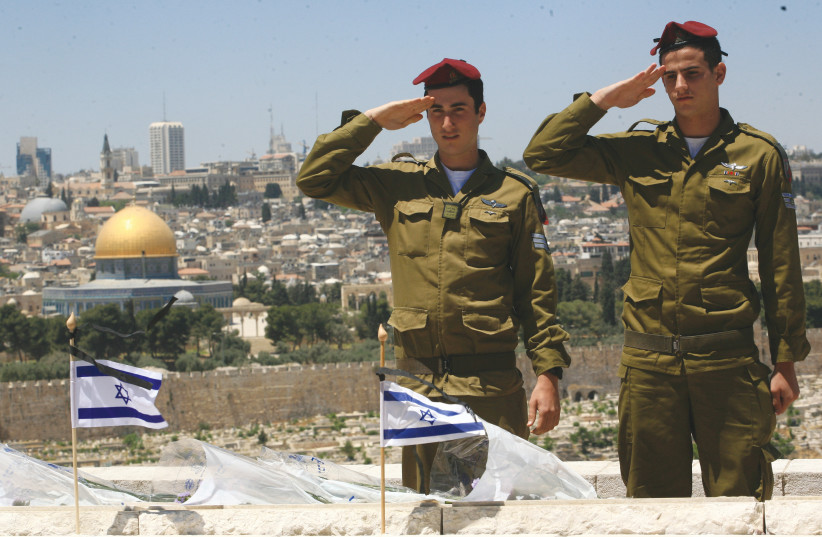As Israel remembers its fallen who gave their lives protecting the country throughout its 74 years of independence, the Defense Ministry’s Department of Families and Commemorations is reaching out to all bereaved families, including those living abroad.
“Everyone is with the bereaved families right now,” Arye Mualem, head of the Department of Families and Commemoration, told The Jerusalem Post. “These are complicated and sensitive days.”
“Remembrance Day for the Fallen of Israel’s Wars, in my eyes, is one of the most meaningful days in Israel,” he said. “The whole of Israel is connected, understands and salutes those who have fallen while at the same time are embracing the families, across the country. So many citizens are standing together on this one day for a specific goal to get to cemeteries to support the bereaved families.”
In total, 24,068 IDF soldiers, police officers, prison wardens, Shin Bet (Israel Security Agency) security service and Mossad agents have been killed since 1860 defending the pre-state Yishuv and Israel. That number also includes members of the pre-state militias and the Jewish Brigade, who served in the British army during World War II.
According to the National Insurance Institute, some 3,199 civilians were killed in hostilities since the establishment of the state.

Remembrance Day will begin at 8 p.m. on Tuesday, May 3 when a one-minute-long memorial siren will sound across the country. Immediately after the siren, memorial ceremonies will take place across the country with the main one to be held at the Western Wall in the Old City of Jerusalem in the presence of President Isaac Herzog and Chief of Staff Lt.-Gen. Aviv Kohavi.
On Wednesday, May 4, a two-minute-long siren will sound at 11:00 a.m. followed by official state memorial services at 52 military cemeteries across the country and at memorial sites.
The ministry’s Department of Families and Commemoration is responsible for all Remembrance Day events.
Mualem, who has spent the past 15 years as the head of the department, said that there is “no other moment” that encapsulates Israel than the two-minute-long siren and the lowering of the flag.
“The two moments of silence have a lot of power and give a lot of respect to the fallen,” he added.
Under Mualem, the department works to reach every bereaved family-in Israel and abroad- and customizes support as per the need of each family. In addition to the financial support provided to families and widows, the ministry provides social workers, psychologists and other means of mental support.
According to him, the social and emotional support given to families is so comprehensive that other countries look to Israel when building plans to support their own bereaved families.
“The country has understood that the loss experienced by bereaved families has affected them,” he said, adding that while “we can’t bring back their sons, we can be there for the family and embrace them along this long road of mourning.”
Along with the memorial events in Israel, and as an ongoing effort to strengthen the connection with bereaved families living abroad, the Department of Families and Commemoration and the World Zionist Organization produced a joint online hybrid memorial ceremony.
The ceremony includes a video of the memorial service in Mount Herzl’s Memorial Hall which will be available on the Defense Ministry’s YouTube channel. The ministry said that there will also be “customizable online content that each community can use individually, available on the Department of Families and Commemoration’s website.”
The ceremony will be shared with Jewish communities around the world and is available in Hebrew, English, Spanish, French, and Russian.
Mualem told the Post that “it’s important to have a direct connection” with families who live abroad. He said that a few hundred families come to Israel supported by the ministry every year to commemorate their son or daughter.
“We can’t forget these families,” he said, explaining the importance of the hybrid ceremony for the families who could not make it this year to Israel.
In addition, Mualem said that the ministry has initiated a project called “Communities Embracing Families” where Diaspora Jewish communities “adopt” bereaved families in their communities. As part of the project, which will be launched on May 19th in Miami, Florida by Defense Minister Benny Gantz, communities will provide families with the emotional support needed throughout the year.
“This way we continue to strengthen our ties with families abroad,” he said.
While Jewish communities across the world understand the importance of Remembrance Day and have a strong connection to Israel, there is a growing number of Diaspora Jewish youth who are moving away from their Jewish identity and Israel.
And that is just “one of the reasons that we are doing this project of ‘Communities Embracing Families,'’’ Mualem said. “We are inviting teenagers and youth in diaspora communities and talk with them about those who gave their lives for the country because we believe that the more we talk about them, the more we will remember them and not forget.
We believe that the ethos of the IDF, the country and of fallen and their stories will make the youth understand what it means to love the country and fight for it and protect it.”
